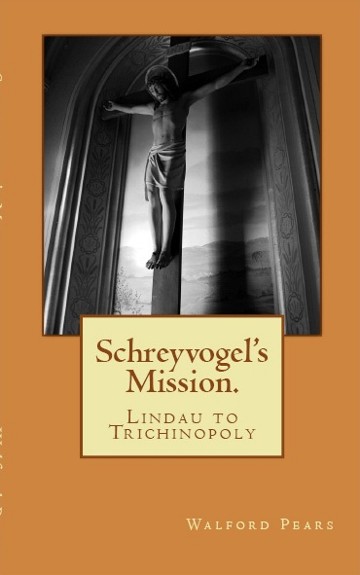Daniel
Schreyvogel was born in Lindau in the South of
Germany, in the year 1777. Lindau is a city and an island on Lake Constance.
He
received a good education as it’s recorded that
he graduated in Leipzig. He was known
for being meditative, contemplative and observant. He did not
frequently join in games and sports with his school fellows; instead he
was happy to enjoy his own thoughts in some solitary walk. The
acuteness of observation he practised from boyhood, stood him in good
stead in later life as a Missionary in India.
He
decided to become a missionary and was admitted into a college at Halle in Saxony, to be
instructed for the ministry. Halle accommodates Germany's oldest Evangelic Bible college
and was founded by August Francke
which became a stronghold of Pietism.
Pietism was basically a loosening of strict Lutheran orthodoxy and is
generally regarded as the 3rd phase of
Lutheranism.
In 1803
he sailed from Copenhagen to join The Royal Danish Mission
in Tranquebar, South India.
Daniel
Schreyvogel was a prolific writer of letters and a diarist. A vast
source of material concerning him is held in documents, most in old
German script, at the Francke
Foundation Hall in Halle, Germany. I was only able to skim the
surface of some of these documents; they would be invaluable source to
someone someday who intended to delve much deeper into his life.From all these
sources I was able glean some trivia; I found bills for the clothes and
shoes he bought and bills for his lodgings and travel expenses and even
a record of his clothes being stolen; all this prior to him leaving
Germany for India. Also, his son Daniel Henry who was born in India is acknowledged
to be the first German to settle in South Australia in 1836.
On
a more serious side, documents show he was a dedicated learner and
became proficient in several languages in addition to his studies of
scripture. He came across as being extraordinarily passionate and
committed to spreading the word about Jesus Christ, the bible and the
conversion and shepherding of his flock. I was able to form an impression
of his character; he was single minded and totally devoted to
everything he did, although sometimes with impatience. He was a man of
strong views and made these views known through his sermons and letter
writing. He rarely took ‘no’ for an answer
and pursued all quests to the very end. |
A story of the life and times
of Rev. Daniel Schreyvogel, a Christian missionary to India in the early 1800s

He laboured tirelessly in
Tranquebar till 1826 when he was appointed Missionary of Trichinopoly
by Bishop Heber. He left the Danish Mission which was falling apart and
joined the English Society for the Propogation
of Christian Knowledge.
He was also one
of moral character. He was one of the first to have and to forcibly
express views about the unfairness of the Hindu caste system and indeed
was central to the change in the Anglican Church’s attitude to
it. Having learnt Tamil and being able to have free intercourse with
the ‘natives’ in the
vernacular, he came to realise the true nature of caste. He said “It compelled a
certain section of society to be permanently disadvantaged.” He perceived
that this was diametrically opposed to Christianity, inconsistent with
its principles, and opposed to humanity and justice. However strongly
he put his views on this and other matters, privately he had a softer
side and often expressed his hope that while being forthright he had
not given offence. This book contains several aspects that show the
more tender side of his life especially in the period immediately prior
to his death
|
The difficulties faced by mission
work is summed up in his own words in one of his letters in which he
states, “I made many
fatiguing journeys from village to village, to spread the Gospel under
this vertical sun and often in burning winds; that you had frequently
not been able to procure a draught of clear water nor a little milk ;
and in some parts, by day and night, had no other shelter than the
canopy of heaven, and no other comfort than the hope of being made
instrumental in bringing souls to Christ.“
--------
He was acquainted with several well
known people of the time including Johan Peter Rottler an eminent
missionary and botanist, Bishop Heber the second Lord Bishop of
Calcutta, Bishop Wilson, Serforji
II the Maharaja of Tanjore and George Fife Angas
a merchant,
landowner, banker, member of Parliament, prominent Christian and
philanthropist
noted for sending the first settler ships to South Australia.His life came indirectly in contact
with Horatio Nelson’s battle of Copenhagen in 1801 which stopped him leaving Copenhagen for India and was also affected by Napoleon
Bonaparte’s attack on Leipzic
in 1813 which hampered all communications between himself and the
mission headquarters at Halle for some time.
-------
He
married Charlotte Lloyd the daughter of an English officer of the East
India Company in 1813. Together they had a daughter Charlotte Eliza and
a son Daniel Henry. His wife died in 1819 and is buried in the New Jerusalem
Church in Tanquebar. His daughter Charlotte married an
English
Chaplain/Missionary Edward Jarrett Jones in 1835.
--------
Rev. Edward Jarrett Jones
became the Chaplain of Cuddalore and administered to Europeans and
Eurasians. It was in Cuddalore that Rev. Schreyvogel came to spend the
last months of his life with his daughter and son-in-law. He passed
away in nearby Pondicherry on 16th
January 1840, his 63rd
birthday. Memorial stones were placed in churches at both Cuddalore and
Trichinopoly. |


![]()